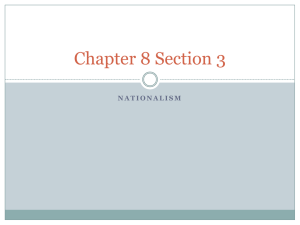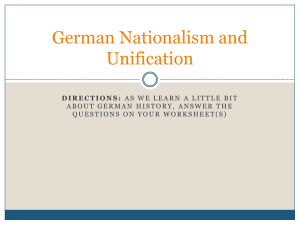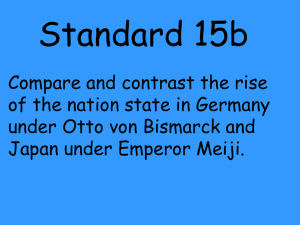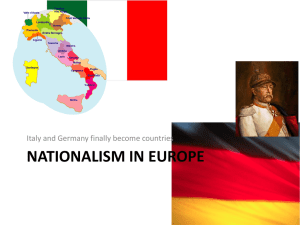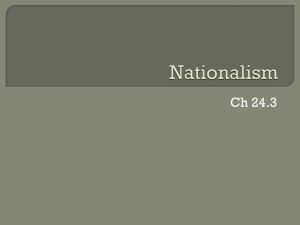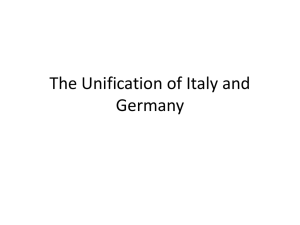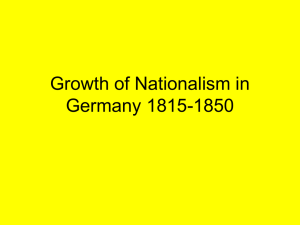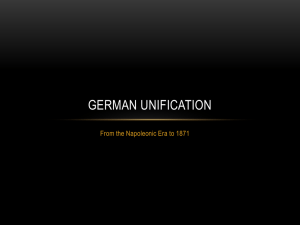Italy and Germany
advertisement
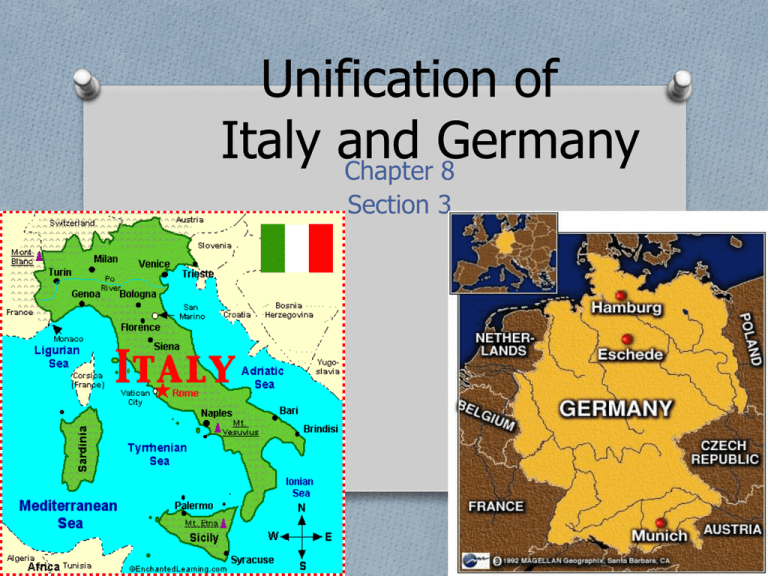
Unification of Italy and Germany Chapter 8 Section 3 Cavour Unites Italy O Nationalism did not only destroy empires, it helped build nations. O Italy formed from crumbling empires. O 1815-1848 – fewer Italians were content to live under foreign rulers. Cavour Leads Italian Unification O Italian nationalists looked for leadership from the kingdom of Piedmont-Sardinia, the largest and most powerful of the Italian states. O Kingdom adopted a liberal constitution in 1848. O Unification sounded like a good plan to the liberal middle-class. Count Camillo di Cavour O Became Prime Minister of Sardinia in 1852. O Worked tirelessly to expand PiedmontSardinia’s power. O Wanted to gain control of northern Italy. Roadblock to Italy O Cavour realized that Austria would cause a major roadblock. O Napoleon III agreed to help drive Austria out of the northern Italian provinces. O Cavour then started a war with Austria. O With the help of the French, Sardinia won two quick victories. O Sardinia took all of northern Italy, except Venetia. Garibaldi Brings Unity O While Cavour was uniting northern Italy, he secretly helped nationalist rebels in the south. O May 1860 – a small army of Italian nationalists captured Sicily. O Army was known as the Red Shirts. O Leader – Giuseppe Garibaldi, and his followers, always wore a bright red shirt in battle. Garibaldi O Garibaldi and his soldiers marched north from Sicily. O Garibaldi agreed to unite southern areas with the kingdom of PiedmontSardinia. O Garibaldi met with King Victor Emmanuel II. O Garibaldi agreed to step aside and let the King rule. Final Additions O 1860 – Venetia became part of Italy. O 1870 – Papal States came under Italian control. O This included the city of Rome. O Rome became the capital of Italy. O The pope would continue to govern a section of Rome known as Vatican City. Bismarck Unites Germany O Like Italy, Germany also achieved national unity in the mid-1800s. O 1815 – 39 German states formed a loose grouping called the German Confederation. O The Austrian Empire dominated the confederation. O However, Prussia was ready to unify all the German States. German Confederation Prussia Leads German Unification O Prussia had several advantages: O Prussia had a large German population O Unlike the Austro-Hungarian Empire O Nationalism unified Prussia and tore Austria-Hungary apart. O Prussia’s army was the most powerful in central Europe. O Berlin rioters forced a constitutional convention to write up a liberal constitution for the kingdom, paving the way for unification. Bismarck Takes Control O 1862 – Wilhelm I succeeded Frederick William to the throne. O Liberal parliament refused him money for reforms that would double the strength of his army. O Major challenge to Wilhelm’s authority. O Based on this information, do you think Wilhelm was a liberal or a conservative? Junkers & Bismarck O Junkers supported his view. O Junkers = strongly conservative members of Prussia’s wealthy landowning class. O 1862 – Wilhelm chose a conservative Junker to be his Prime Minister O Otto von Bismarck Realpolitik O Bismarck became a master at realpolitik. O Means “the politics of unity”. O Used to describe tough power politics with no room for idealism. “It is not by means of speeches and majority resolutions that the great issues of the day will be decided but by blood and iron.” Dealing with Parliament O Bismarck declared that he would rule without: O Consent of parliament O Legal budget O These actions were in direct violation of the constitution. Prussia Expands O 1864 – Bismarck took the first step toward molding an empire. O Prussia and Austria formed an alliance. O Went to war against Denmark to win two border provinces: Schleswig (P) and Holstein (A). O The quick victory increased national pride among Prussians. O Won new respect from other Germans. Seven Weeks’ War Bismarck purposely stirred up border conflicts with Austria over the two provinces. Austria declared war on Prussia in 1866. Prussians used their superior training and equipment devastating victory for Prussia. Austria = humiliated Austrians lost Venetia. Prussia’s Control O Due to its victory, Prussia took control of northern Germany. O Eastern and western Prussia were joined for the first time. O 1867 – the remaining states joined the North German Confederation. O Prussia completely dominated. The Franco-Prussian War O 1867 – a few southern German O O O O O states remained independent. Southern Germans – Catholic Prussia – Protestant South resisted domination by Prussia. Bismarck felt that the southerners would give in if they felt an outside threat. Bismarck felt that a war with France would suffice. Franco-Prussian War (cont.) O Bismarck manufactured “incidents”. O Created the impression that the French ambassador had insulted the Prussian king. O France reacted by declaring war in 1870. O Prussia entered France and captured 83,000 people including Napoleon III. O Parisians finally gave in due to hunger. O Final stage of German unification. After the War O Southern Germans finally had nationalistic feelings. O Accepted Prussian leadership. O 1871 – Captured Versailles. O King Wilhelm I of Prussia was crowned kaiser or emperor. O Called empire The Second Reich O Holy Roman Empire was the first. A Shift in Power O The 1815 Congress of Vienna had established five Great Powers in Europe: O Britain, France, Austria, Prussia and Russia O 1815 – powers were nearly equal in strength. O 1871 – Britain and Germany were the most powerful. O European balance of power had broken down. Questions 1. Which 2 nations were formed because of 2. 3. 4. 5. nationalism? What was Cavour secretly doing in south Italy? What advantage did Prussia have over Austria in uniting the German states? What does realpolitik mean? By 1871, what were the two most powerful countries in Europe?


